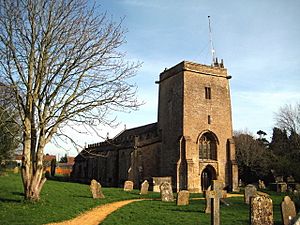Church of All Saints, Merriott facts for kids
Quick facts for kids Church of All Saints |
|
|---|---|
 |
|
| Location | Merriott, Somerset, England |
| Built | 13th century |
|
Listed Building – Grade II*
|
|
| Official name: Church of All Saints | |
| Designated | 4 February 1958 |
| Reference no. | 1175447 |
| Lua error in Module:Location_map at line 420: attempt to index field 'wikibase' (a nil value). | |
The Church of All Saints is an old and beautiful church located in Merriott, a village in Somerset, England. It was built a very long time ago, in the 13th century. This means it is over 700 years old! It is officially recognized as a listed building of Grade II* importance. This special status helps protect the church because it is a very important historical building.
Contents
A Look at History
Building the Church
The Church of All Saints was first built in the 1200s. Imagine how different the world was back then! Over the years, the church changed a bit. In the late 1400s or early 1500s, some parts were updated.
Victorian Changes
Later, in the 1800s, the church had a big makeover. This was part of a "Victorian restoration." During this time, a new chancel was added. The chancel is the part of the church where the altar is. Old wooden galleries, which were like balconies, were also removed. A famous architect named Benjamin Ferrey led this work in 1860.
Church Design and Features
What the Church is Made Of
The Church of All Saints is built from a type of stone called hamstone. This stone gives the church its unique look. The roof is covered with clay tiles.
Inside the Church
The church has a main area called a nave, which has four sections. It also has a chancel with two sections. On the sides, there are aisles, which are like walkways. The church tower is strong and has supports called buttresses at its corners.
The Church Bells
Inside the tower, there are six bells. These bells ring out over the village. The oldest bells were made in the 1730s. They were cast by a famous family of bell makers called the Bilbie family. The inside of the church, including its furniture and decorations, mostly looks as it did after the 19th-century restoration.
See also
- List of ecclesiastical parishes in the Diocese of Bath and Wells

